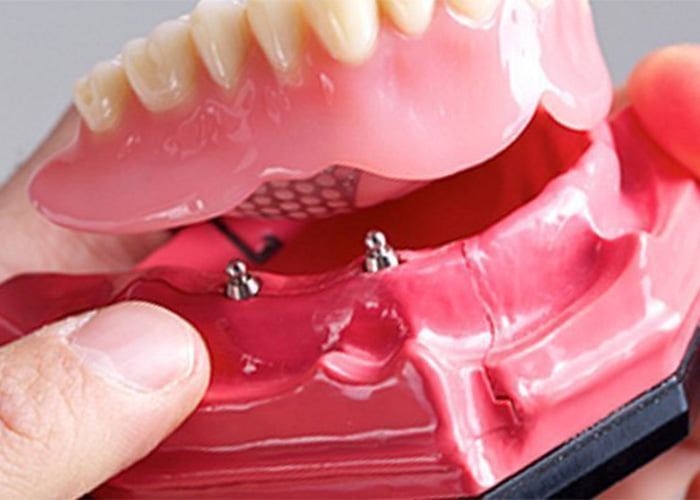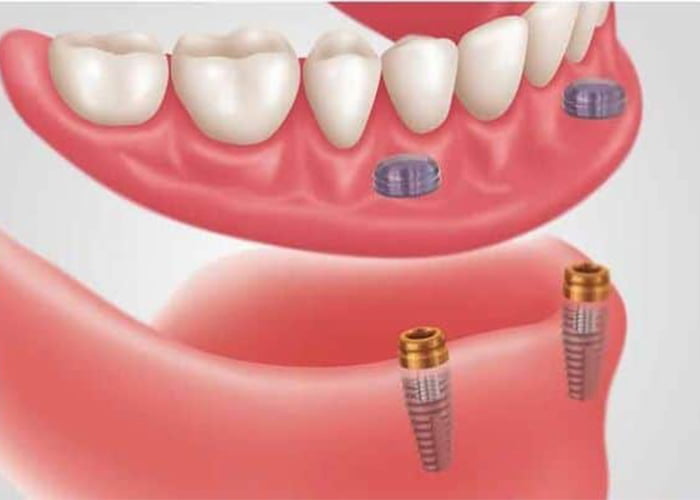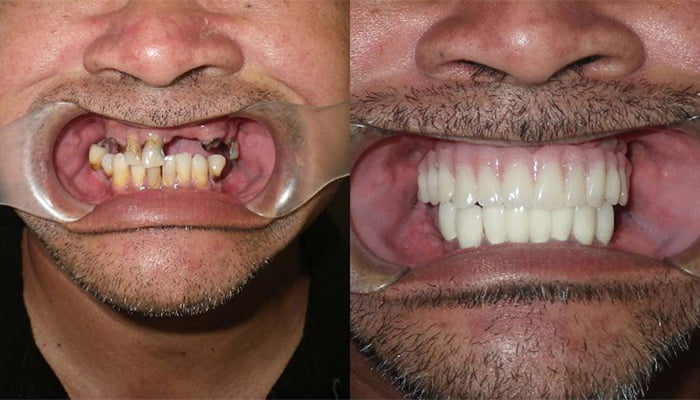Snap-on dentures provide a permanent replacement for missing teeth. Patients can make an informed decision about snap-on dentures by exploring the advantages and aftercare.
Why Snap-On Dentures?
Traditional, removable dentures can help regain a smile but can be uncomfortable for the wearer. People are turning to dental implants and snap-on dentures, also known as implant overdentures, as a more secure option for tooth loss to address these issues.
These dentures are popular due to their improved stability, improved chewing ability, improved speech, and preservation of the bone structure. They can help stimulate the jawbone and prevent bone loss and are easy to maintain and care for. It is important to consult with your dentist to determine the best treatment plan for your needs.
Denture Implants & Snap-On Dentures
A denture implant is a surgical procedure that involves the insertion of a titanium post or rod into the jawbone. It can be used to replace one or more teeth or even an entire row of teeth.
Snap-on dentures, also known as implant overdentures, offer patients a more secure smile that enables them to eat and speak normally. If you are interested in a permanent dental implant solution, our All-In-One Solution involves the placement of implants in your mouth to securely anchor a custom-fitted bridge, providing a fixed solution for missing teeth.
See more: Signs of infection after root canal
Benefits of Snap-On Dentures
Snap-on dentures, also known as implant-retained dentures or snap-in dentures, offer several benefits for people who are missing teeth. Here are some of the benefits of snap-on dentures:
- Improved stability
- Improved comfort
- Improved confidence
- Improved oral health
- Easy maintenance
Snap-on dentures can be a great option for people who are missing teeth and want a more secure and comfortable alternative to traditional removable dentures.
Disadvantages of Snap-On Dentures
While snap-on dentures, also known as implant-retained dentures or snap-in dentures, offer several benefits, there are also some disadvantages to consider. Here are some of the potential drawbacks of snap-on dentures:
- Cost: Snap-on dentures can be more expensive than traditional removable dentures due to the need for dental implants to be placed in the jawbone.
- Surgical procedure: Snap-on dentures require a surgical procedure, making them more invasive and time-consuming than traditional removable dentures.
- Healing time: It can take several months for the implants to fully integrate with the jawbone and gums to heal, requiring temporary dentures.
- Maintenance: Snap-on dentures require regular maintenance to prevent infection and ensure longevity.
- Potential complications: Risks of complications with snap-on dentures include infection, implant failure, and nerve damage.

Compare Dental Implants with Traditional Dentures
Dental implants and traditional dentures are two options for people who are missing teeth. Here’s a comparison of the two:
Dental Implants:
- Dental implants are artificial tooth roots that are surgically placed into the jawbone.
- They provide a stable foundation for a single tooth, bridge, or denture.
- Dental implants are a more permanent solution than traditional dentures and can last a lifetime with proper care.
- They look and feel like natural teeth and can improve your ability to eat and speak.
- Dental implants stimulate the jawbone and can prevent bone loss, which can occur when teeth are missing.
- They require a surgical procedure and can be more expensive than traditional dentures.
Read more: Why do my dentures cutting into the gums?
Traditional Dentures:
- Traditional dentures are removable appliances that replace missing teeth.
- They are held in place with adhesive or suction and can be removed for cleaning and maintenance.
- Traditional dentures can be less expensive than dental implants and don’t require a surgical procedure.
- They may not fit as securely as dental implants and can slip or move while eating or speaking.
- They can cause sore spots or discomfort in the mouth and may require adjustment over time.
- Traditional dentures do not stimulate the jawbone and can lead to bone loss over time.
Snap-on Denture FAQs
Dentist For Life can provide some frequently asked questions and answers about snap-on dentures.
Snap-on Dentures Aftercare
Snap-on dentures, also known as implant-retained dentures or snap-in dentures, require regular care to ensure their longevity and prevent oral health issues. Here are some aftercare tips for snap-on dentures:
- Practice good oral hygiene: Brush natural teeth, gums, and tongue twice a day with a soft-bristled toothbrush and fluoride toothpaste, and clean dentures daily.
- Visit your dentist regularly: Dentists can check the fit and condition of dentures and identify potential issues.
- Avoid hard or sticky foods: Cut food into small pieces and chew slowly to prevent damage to dentures or gums.
- Avoid smoking and excessive alcohol consumption: Quit smoking and limit alcohol consumption to promote oral health and overall wellness.
- Store your dentures properly: Store dentures in a clean, dry container, avoiding hot water, bleach, or harsh chemicals.
- Contact your dentist if you experience any issues: Delaying treatment can lead to serious oral health issues.
By following these aftercare tips, you can help ensure the longevity and comfort of your snap-on dentures and maintain good oral health.
How do I clean my snap-on dentures?
Cleaning your snap-on dentures is an important part of their care and maintenance. It is important to remove and clean them daily to prevent bacteria buildup and oral health issues. To do this, use a soft-bristled brush and mild soap or denture cleaner to clean all surfaces, including the top, bottom, and sides of the dentures, as well as the attachment mechanisms. Rinse thoroughly and soak them in a denture cleaning solution or warm water overnight to remove any remaining bacteria and keep them clean and fresh. Rinse again before putting them back in your mouth.
How long will my snap-on dentures last?
Snap-on dentures, also known as implant-retained dentures, can last for many years, depending on the quality of the dentures, how well they are cared for, and the patient’s oral health. It is important to follow the aftercare instructions provided by your dentist and maintain regular maintenance. If you experience any issues with your dentures, it is important to see your dentist as soon as possible to prevent further damage.
Alternative treatments
There are several alternative treatments to snap-on dentures that may be appropriate depending on the individual’s oral health, lifestyle, and personal preferences. Here are some alternative treatments to consider:
- Traditional removable dentures
- Dental bridges
- Dental implants
- All-on-4 implants
- Mini dental implants
Dentists can help determine the best treatment plan for individual needs and goals.
Can you eat with snap-on dentures?
You can eat with snap-on dentures, but there may be some foods that are more difficult to eat than others. Snap-on dentures are designed to be more secure than traditional dentures. But they can still become loose or dislodged when eating certain types of foods.
- Here are some tips for eating with snap-on dentures:
- Start with soft foods
- Cut food into smaller pieces
- Avoid sticky or hard foods
- Chew on both sides of your mouth
- Use caution when biting into food

Can snap-on dentures be done in one day?
In some cases, snap-on dentures can be done in one day. These is known as “same-day dentures” or “immediate dentures.” Same-day snap-on dentures are typically made in advance of an extraction appointment to ensure they can be placed immediately after the teeth are removed. The process includes an initial consultation, impression, extraction, placement, follow-up appointments, and oral health evaluation. It is important to follow the aftercare instructions provided by the dentist to ensure the best possible outcome.
Do snap-on dentures help with bone preservation?
Snap-on dentures can help with bone preservation, but they are not a complete solution, and over time the jawbone will continue to deteriorate. Regular dental checkups and proper denture care can help to maintain oral health and reduce the risk of bone loss.
Conclusion
In conclusion, snap-on dentures offer numerous benefits for individuals seeking a secure and comfortable solution for replacing missing teeth. From improved chewing and speech ability to enhanced comfort and stability, snap-on dentures provide a natural-looking and functional solution that can also help prevent bone loss and gum recession.
If you are looking for a dentist in Marysville, Ohio to discuss snap-on dentures, Dentist For Life is here to help. Contact us to schedule an appointment and learn more about how snap-on dentures can benefit you.



